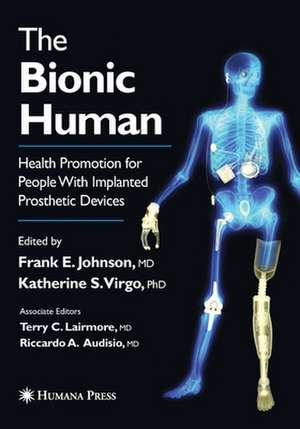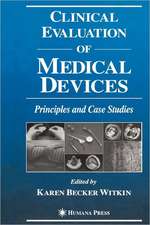The Bionic Human: Health Promotion for People with Implanted Prosthetic Devices
Editat de Frank E. Johnson, Katherine S. Virgoen Limba Engleză Paperback – 23 aug 2016
| Toate formatele și edițiile | Preț | Express |
|---|---|---|
| Paperback (1) | 1245.22 lei 6-8 săpt. | |
| Humana Press Inc. – 23 aug 2016 | 1245.22 lei 6-8 săpt. | |
| Hardback (1) | 1259.57 lei 6-8 săpt. | |
| Humana Press Inc. – noi 2005 | 1259.57 lei 6-8 săpt. |
Preț: 1245.22 lei
Preț vechi: 1518.55 lei
-18% Nou
Puncte Express: 1868
Preț estimativ în valută:
238.30€ • 247.87$ • 196.73£
238.30€ • 247.87$ • 196.73£
Carte tipărită la comandă
Livrare economică 14-28 aprilie
Preluare comenzi: 021 569.72.76
Specificații
ISBN-13: 9781493956685
ISBN-10: 149395668X
Pagini: 704
Ilustrații: XVI, 704 p.
Dimensiuni: 178 x 254 mm
Greutate: 1.23 kg
Ediția:Softcover reprint of the original 1st ed. 2006
Editura: Humana Press Inc.
Colecția Humana
Locul publicării:Totowa, NJ, United States
ISBN-10: 149395668X
Pagini: 704
Ilustrații: XVI, 704 p.
Dimensiuni: 178 x 254 mm
Greutate: 1.23 kg
Ediția:Softcover reprint of the original 1st ed. 2006
Editura: Humana Press Inc.
Colecția Humana
Locul publicării:Totowa, NJ, United States
Cuprins
Overview.- Assessment of Surveillance Test Performance and Cost.- Costs of Follow-Up After Implantation of Prosthetic Devices.- Factors That Should Shape Clinical Strategies.- A View From the US Food and Drug Administration.- Societal Issues.- Databases for Studying the Epidemiology of Implanted Medical Devices.- Tissue Reaction to Prosthetic Materials.- Prevention of Infection in Prosthetic Devices.- European Counterpoint to Chapter 9.- Computer Modeling.- Breast Prostheses.- US Counterpoint to Chapter 11.- European Counterpoint to Chapter 11.- Prostheses for Hernia Repair.- US Counterpoint to Chapter 12.- European Counterpoint to Chapter 12.- Penile Prostheses.- US Counterpoint to Chapter 13.- European Counterpoint to Chapter 13.- Artificial Urethral Sphincters.- US Counterpoint to Chapter 14.- European Counterpoint to Chapter 14.- Cerebrospinal Fluid Shunts.- US Counterpoint to Chapter 15.- European Counterpoint to Chapter 15.- Cochlear Implants.- US Counterpoint to Chapter 16.- European Counterpoint to Chapter 16.- Ossicular Implants.- US Counterpoint to Chapter 17.- European Counterpoint to Chapter 17.- Vascular Prostheses.- US Counterpoint to Chapter 18.- European Counterpoint to Chapter 18.- Cardiac Valves.- US Counterpoint to Chapter 19.- European Counterpoint to Chapter 19.- Intravascular Filters and Stents.- US Counterpoint to Chapter 20.- European Counterpoint to Chapter 20.- Vascular Access Devices.- US Counterpoint to Chapter 21.- European Counterpoint to Chapter 21.- Osseointegrated Dental Implants.- US Counterpoint to Chapter 22.- European Counterpoint to Chapter 22.- Cardiac Pacemakers.- US Counterpoint to Chapter 23.- European Counterpoint to Chapter 23.- Joint Prostheses and Internal Fixation Devices.- US Counterpoint to Chapter 24.- European Counterpoint to Chapter 24.
Textul de pe ultima copertă
Although every year 5-10 million Americans have prosthetic devices fitted in their bodies, there are currently few well-accepted standards for their ongoing clinical management. In The Bionic Human: Health Promotion for People With Implanted Prosthetic Devices, a diverse panel of implant experts surveys the state of the art in patient follow-up for the most common prosthetic devices. The devices covered range from breast, penile, vascular, and joint prostheses to cochlear, ossicular, and dental implants, and include cerebrospinal fluid shunts, cardiac valves, stents, and pacemakers. For each device, the authors consider its pros and cons, detail the best current strategies to keep patients with implants healthy, and evaluate the latest and most promising new diagnostic tests. Clinical counterpoints from distinguished authorities at major centers in the United States and Europe are offered throughout. Follow-up recommendations are summarized in a standardized format that allows comparative analysis and lays the foundation for controlled clinical trials and the eventual establishment of evidence-based guidelines. Additional chapters address epidemiological, societal, and policy issues associated with prosthetic use: what should be done to detect and/or prevent problems with implants, to detect such low-frequency events as the development of cancer, and to uncover the disorders to which patients with prostheses might be unusually prone? Finally, what are the costs of follow-up care and how should society allocate resources to care for these patients?
Concise and highly practical, The Bionic Human: Health Promotion for People With Implanted Prosthetic Devices offers busy practitioners an integrated survey of best practices for the management of patients with implanted prosthetic devices and an insightful examination of the epidemiological, societal, and policy issues associated with their use.
Concise and highly practical, The Bionic Human: Health Promotion for People With Implanted Prosthetic Devices offers busy practitioners an integrated survey of best practices for the management of patients with implanted prosthetic devices and an insightful examination of the epidemiological, societal, and policy issues associated with their use.
Caracteristici
Includes supplementary material: sn.pub/extras









